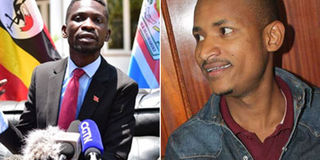What Bobi and Babu can learn from Malema, Frantz Fanon

Bobi Wine and Babu Owino are both unashamed distant apprentices and probable future comrades of Julius Malema, leader of South Africa’s militant Economic Freedom Fighters (EFF) opposition party. PHOTOS | FILE | NATION MEDIA GROUP
What you need to know:
The one thing Babu and Kyagulanyi can learn from Malema is the necessity of cogent policy positions akin to the EFF’s seven non-negotiable pillars.
In dealing with Malema, South Africans know exactly what they are buying into, which creates a sense of predictability, even if one disagrees with the EFF.
Ugandan musician-turned-politician Kyaddondo East MP Robert Ssentamu Kyagulanyi — better known as Bobi Wine — has been on a tour of gratitude in Nairobi, where he has held a number of events, his lead host being Embakasi East MP Babu Owino.
According to Kyagulanyi, Nairobi is important to him because following his arrest and detention on the final day of campaigns during the Arua Municipality by-election — which Kyagulanyi’s candidate won — it was in Kenya where the bulk of support came from in demanding for his release alongside that of 32 of his comrades, accused of stoning President Yoweri Museveni’s motorcade as it departed Arua.
OFFICIALDOM
Moving around like twin brothers — including doing joint talk shows — the camaraderie between Babu and Kyagulanyi seemed to imply that theirs is a dalliance that goes beyond officialdom, being that as Secretary- General of the Kenya Young Parliamentarians Association — the caucus under whose auspices Kyagulanyi was visiting — Babu had to step up anyway.
Yet despite the well-aligned optics, one might in fact argue that Babu and Kyagulanyi are cut from extremely different pieces of cloth, their many non-political similarities notwithstanding. They are both self-confessed products of the ghetto, Babu having reiterated time and again that he grew up in Kisumu where his mother was a chang’aa vendor, while Kyagulanyi was for many years hailed as the Ghetto President, having risen from nothing to become a leading pop star.
TRASH TALK
They are both crowd pleasers in that youthful-fervour-filled fiery way, Babu working crowds with his signature Tibim! and Tialala! sloganeering and occasional trash talk, like when he called President Uhuru Kenyatta unprintables before they reconciled. On the other hand, Kyagulanyi alternates between rousing lyrics and his People Power rhetoric, urging his mostly youthful supporters to get up, stand up — to stand up for their rights in that Bob Marley way.
Then their differences unravel.
OPPOSITION
Babu, a front-row member of a mainstream opposition party, learnt his trade by domineering student politics at the University of Nairobi, where he was guild President for an unprecedented four consecutive terms.
On his part, Kyagulanyi, admittedly an ardent admirer of the then youthful fire-spitting Yoweri Museveni, seems to have attended the metaphoric School of Hard Knocks — where one is bound to hit and miss in equal measure — coming across as a street smart self-styled general. He remains an independent in the Ugandan parliament, doubling as leader of an amorphous people’s movement, which many speculate may morph into a political party. Their differences notwithstanding, Babu and Kyagulanyi still present a unified front, as if they have all their T’s crossed and I’s dotted as regards a shared ideology. Yet if one were to ask what exactly Babu’s and Kyagulanyi’s individual and/or collective beliefs are, there’s a high likelihood that the answers would come painted in very broad strokes: Empower the youth, fight corruption, oppose authoritarianism.
APPRENTICES
For the most part, these articulations as picked from their public pronouncements are mostly about what the legislators are against, as opposed to what they believe in, in the form of the sort of programmes they would implement were they to ascend to power tomorrow morning.
In more specific terms, one may struggle to pinpoint whether the two are Marxists, socialists, communists, capitalists, conservatives or anarchists. Yet it is noteworthy that they are both unashamed distant apprentices and probable future comrades of Julius Malema, leader of South Africa’s militant Economic Freedom Fighters (EFF) opposition party.
NOTORIETY
In this regard, the one thing Babu and Kyagulanyi can learn from Malema is the necessity of cogent policy positions akin to the EFF’s seven non-negotiable pillars, which include land expropriation without compensation for equitable redistribution, free education, healthcare and housing, and the nationalisation of mines, banks and other strategic sectors of the economy.
In dealing with Malema, South Africans know exactly what they are buying into, which creates a sense of predictability, even if one disagrees with the EFF.
Having well defined policy aspirations will guarantee a sense of longevity for Babu, Kyagulanyi and others like them — who may not be leading parliamentary parties or enjoying Malema’s degree of notoriety — for them to make measurable strides towards an ultimate policy destination. Kyagulanyi and Babu might do well to heed the revolutionary psychiatrist Frantz Fanon who wrote that “each generation must discover its mission, fulfil it or betray it, in relative opacity.’’
@IsaacOtidiAmuke; [email protected]





